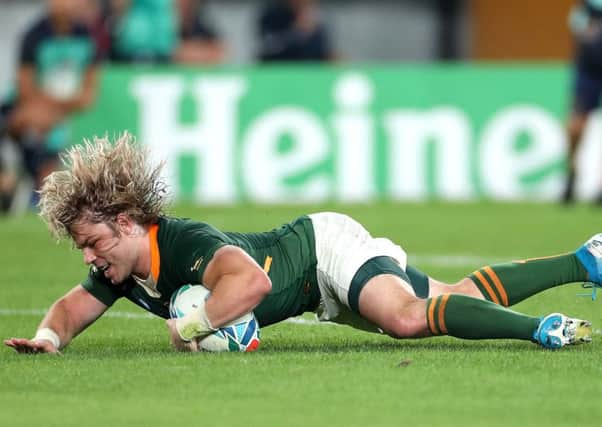Allan Massie: Beware the Boks.They may be too strong for Wales


Japan have given this World Cup its love story but South Africa were in no mood to allow it to continue. Japan again played with the adventure, spirit and imagination that have delighted everyone, but they came under sustained pressure such as they experienced only for brief periods in their matches against Ireland and Scotland. For most of the Scotland game Japan made no handling errors ; the South African blitz defence not only denied them space and time but hustled them into mistakes. The power of the South African forwards and the kicking of scrum-half Faf de Klerk forced Japan on to the back foot, and they had to play almost all the second 40 minutes deep in defence. South Africa weren’t perfect. They lost several line-outs and squandered several try-scoring chances, but it was a case of the old boxing adage: a good big ‘un will beat a good little ‘un..
These three matches were good, but lacking in tension since the outcome was clear quite early on. In each the better team won. Wales v France was very different, and the Welsh coach, Warren Gatland, conceded that the better team lost. That’s often the case when the losing team scores more tries, and if the French fly-half, young Romain Ntamack, hadn’t hit the post twice, once with an attempted conversion and then with a penalty on the stroke of half-time, France might have been out of sight. He had been injured just before that penalty attempt and didn’t return to the field after the break; this was unfortunate because he had been playing beautifully. Then there was at least an element of doubt about the Welsh try that won the game. All the same, despite being very much second-best for 74 minutes, Wales once again justified Gatland’s claim that his team don’t know how to lose.
Advertisement
Hide AdAdvertisement
Hide AdSome might say that Jacques Brunel’s French side too often don’t yet know how to win. Certainly it doesn’t help if a moment of idiocy has you playing the last half-hour of a match with only 14 men. Nobody could dispute the red card given to Sebastien Vahaamahina; his elbow into Aaron Wainwright’s face was not only stupid but nasty. Eight years ago France beat Wales in the quarter-final after Sam Warburton was sent off for a dangerous tip tackle on Vincent Clerc. So revenge, as the Sicilian proverb has it, is a dish best eaten cold. It’s a measure of how the game has moved on that in 2011 the Irish referee Alain Rolland’s decision to give Warburton a red card was controversial; there would be no more argument about that sort of tackle now than there was about Vahaamahina’s red on Sunday.
Still what is it about South African referees in the World Cup? We Scots all remember Craig Joubert four years ago. Now Sunday’s referee Jaco Peyper has allowed himself to be photographed playfully re-enacting that elbow in the face with a bunch of Welsh fans. Very amusing for them of course, but very stupid of him. Nobody of sense supposes that international referees are biased, but they should take care to avoid any suggestion that they may have been. All the more so in Peyper’s case, because some, not only French fans, may think that the yellow card given to Ross Moriarty, pictured left, for a round-the-neck tackle just before half-time should have been a red. I thought yellow the right decision, but it was a close call, and the relieved expression on Moriarty’s face as he walked off showed that he had feared the worst. As it was, he was free to return and score the winning try.
So we have two North-South semi-finals, England-New Zealand on Saturday and Wales-South Africa on Sunday. The odds are still for the wheel to come full circle and the last match of the Cup to be a reprise of the first: New Zealand against South Africa. England will surely need to have a bigger share of possession than they had against Australia if they are to beat the All Blacks, and, though they have the ability to score tries from deep, they are still not as adept as New Zealand at feasting off their opponents’ mistakes. We may see them playing in a more limited and traditionally English style, trying to squeeze the All Blacks and disturb their composure. As for Wales, the team fashioned by Gatland and Shaun Edwards has none of the flair of the great Welsh sides some of us are old enough to remember, but they are very hard to beat. They remind us that there is more than one road to success and that dull rugby can also be winning rugby. Yet, of the four teams left, Rassie Erasmus’s South Africa seem to be the one that is improving fastest. They have the most powerful pack left in the tournament and in Faf de Klerk the best scrum-half at controlling a match. So I fear they may be too much for Wales.